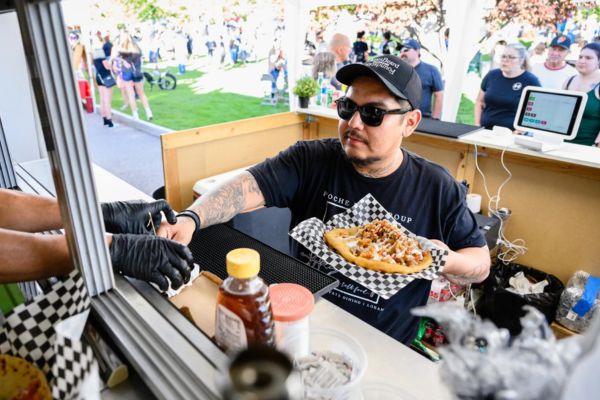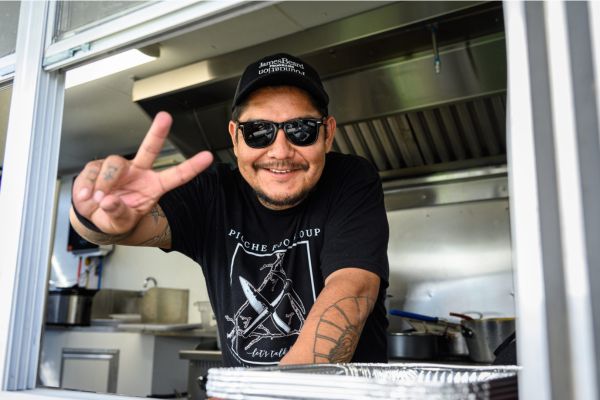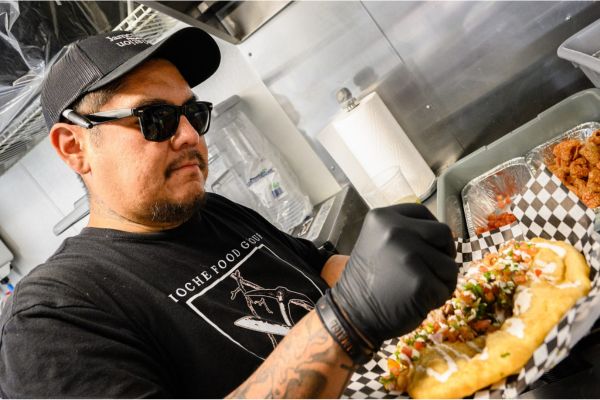
- Details
- By Michael Benanav, Searchlight New Mexico
Diné chef Justin Pioche earned one of the country’s most coveted culinary honors. He serves a lot more than food.
This article was originally published in Searchlight New Mexico. Searchlight New Mexico is a nonprofit, nonpartisan media organization that seeks to empower New Mexicans to demand honest and effective public policy.
The only chef from New Mexico who was a finalist for this year’s James Beard Awards was recently manning a food truck in his hometown of Farmington, at the annual Memorial Day weekend Riverfest. His tattooed hands busily dished up what he thinks of as “our version of bar food” — green chile pork on frybread, tacos, nachos, and the like, served on paper plates. Winners of the elite awards, known as the “Oscars of the food world,” would be announced in just over a week.
Based in nearby Fruitland, 37-year-old Justin Pioche — pronounced Pie-oh-chee — belongs to the Salt Clan Diné, born for the Folded Arms People. With help from his family, perhaps especially his younger sister, Tia, he runs Pioche Food Group. Rather than establishing a restaurant, he’s opted to experiment with an alternative business model, staging pop-up gourmet dinners, catering private events and bringing his food truck to regional festivals.
“I’m not ready to be tied down to a brick-and-mortar location just yet — right now I have lots of opportunities to travel around the country and internationally, which I couldn’t do if I had to be in the same kitchen all the time,” he says. Wherever he goes, the inspiration for his culinary creations — which earned him the nomination for Best Chef in the Southwest — remains firmly rooted in the Four Corners region.
It wasn’t Pioche’s lifelong dream to become a chef. “I wanted to be a rock star, and I was a pretty good drummer,” he says. “But my mom told me it wouldn’t pay the bills, that I needed something to fall back on.” He knew he liked cooking, so he enrolled at the Arizona Culinary Institute, graduating in 2014. At first, it seemed like there were fewer job opportunities for chefs than for percussionists. “No one was hiring then, so I ended up working at a Fuddruckers. I hated it.” But an unexpected encounter changed everything.
While on vacation in Florida with his father, Pioche happened to recognize celebrity chef Robert Irvine standing outside of Margaritaville at Universal Citywalk in Orlando. Pioche nervously approached Irvine and told him how much he appreciated what Irvine was doing for the culinary industry, adding that he hoped to have an opportunity to feed him someday.
 (photo: Michael Benanav. Copyright 2023 Searchlight New Mexico.)
(photo: Michael Benanav. Copyright 2023 Searchlight New Mexico.)
When Irvine learned that Pioche was languishing at Fuddruckers, he said, “You need to get out of that bullshit kitchen and start cooking real food.” Within seconds, Irvine was on the phone with Phoenix-based chef and Food Network personality, Beau MacMillan: “I’ve got this kid here, some punk with tattoos,” Irvine told MacMillan, as Pioche remembers it. “Give him a job.”
Before long, Pioche was under MacMillan’s wing at Sanctuary on Camelback Mountain, in Paradise Valley, Arizona. He went on to learn from other top chefs in the region, including Kevin Binkley, Brandon Gauthier and Ryan Pitt.
Pioche’s private dining experiences are known as the LorAmy Supper Club. These nine-course gourmet meals feature regional foods, in season, from local squash and melons to Navajo-Churro lamb. “Things get very intricate — sometimes a plate will have 12 elements,” Pioche says. Every detail is considered, including the music playlist that helps create a deliberate ambiance for a multi-sensory feast that is also an introduction to Navajo culture. “Just by saying LorAmy, we’re welcoming you into our family. Navajo people introduce ourselves first with our mother’s clan, then our father’s, and my mom’s mom’s name was Lorene, my dad’s mom is Amy, so we combined the two.”
Pioche has few pretensions when it comes to food or his own ego. He tries to gauge his audience in any given setting. “Our style is just good food that people want to eat, for a price they can afford,” he says. While his LorAmy dinners offer a carefully curated culinary experience, and he sometimes presents a “decolonized menu with fully traditional ingredients,” food truck dishes are more casual and can be served up quickly.
Currently retired, Janice E. Brown, Pioche’s mother, worked for years as a payroll technician at the Navajo Mine, a tribal coal mining operation, while Pioche’s father is in his 29th year there as a heavy equipment mechanic. Brown, along with her mother, Lorene Hersey, and her sister, Cyndi Trujillo, performed in the Fruitland Gospel Trio, singing Christian hymns, often translated into Diné. “My mom was a soprano, I’m a tenor, and my sister is an alto,” Brown says. “My mom could speak fluent Navajo, so she did the translations and we learned what to sing from her.” The trio was invited to churches around the country, as far away as Alaska, and recorded six CDs. Brown always knew that Pioche was “talented, blessed with food,” as he had to cook for his younger siblings while she was at work. “I think he inherited his gift from my mom,” she says. “He didn’t get it from me!”
 (photo: Michael Benanav. Copyright 2023 Searchlight New Mexico.)
(photo: Michael Benanav. Copyright 2023 Searchlight New Mexico.)
Even when working his food truck, Pioche insists on serving freshly made fry bread and tortillas. Here, he gets some help from Gloria Tanner, an old friend of his mother’s who has lived with their family for the past 25 years and is considered a part of it. Pioche is also assisted in the kitchen by his uncle, Eldon Hersey, who was adopted years ago by his grandmother, Lorene.
In tandem with his culinary work, Pioche is an Americorps member who pitches in at the nonprofit Navajo Ethno-Agriculture educational farm along the San Juan River, in the Nenahnezad Chapter, west of Farmington. He helps teach traditional farming techniques to students from Navajo Prep and keeps a small garden there to grow plants that he uses in the dinners he creates. He credits one of the farm’s founders, Nonabah Lane, as being an important mentor who pushed him to excel. “She always said, ‘If you’re comfortable, you’re not growing,’ and urged me to stop belittling my capabilities.” Another of his local mentors is Diné botanist and author Arnold Clifford, whose knowledge of plant life in Navajo country is legendary.
The 2023 James Beard Award winners were announced in Chicago on June 5. Pioche didn’t come home with the Best Chef: Southwest prize — it went to Andrew Black, whose restaurant Grey Sweater is in Oklahoma City. In a phone conversation a few days after the ceremony, Pioche sounded upbeat. “I wasn’t too hung up on losing — it was just awesome to be there, among all these great people. Everyone was showing us a lot of love, and I found I really have something to add to the conversation about food.”
Chef Beau MacMillan agrees. Pioche, as he puts it, is ”inspired and true to his roots. He’s working in a unique space in food due to his history and the ingredients he seeks out. It shows his love for his culture. It’s tapped into that truth.
Help us defend tribal sovereignty.
At Native News Online, our mission is rooted in telling the stories that strengthen sovereignty and uplift Indigenous voices — not just at year’s end, but every single day.
Because of your generosity last year, we were able to keep our reporters on the ground in tribal communities, at national gatherings and in the halls of Congress — covering the issues that matter most to Indian Country: sovereignty, culture, education, health and economic opportunity.
That support sustained us through a tough year in 2025. Now, as we look to the year ahead, we need your help right now to ensure warrior journalism remains strong — reporting that defends tribal sovereignty, amplifies Native truth, and holds power accountable.
 The stakes couldn't be higher. Your support keeps Native voices heard, Native stories told and Native sovereignty defended.
The stakes couldn't be higher. Your support keeps Native voices heard, Native stories told and Native sovereignty defended.
Stand with Warrior Journalism today.
Levi Rickert (Potawatomi), Editor & Publisher

